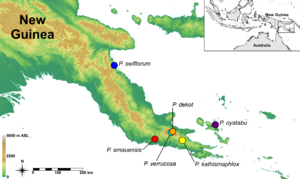Shortcut: WD:ICEI2018User:Daniel Mietchen/Talks/ICEI 2018/Wikimedia projects and citizen science
Wikimedia projects and citizen science

|
 |

|
Abstract[edit]
When searching the web for information on a given topic — say, citizen science — Wikipedia will often come up high in the search results. What is less known is that Wikipedia forms the nucleus of an entire ecosystem of Wikimedia projects that are roughly organized by information channel. Besides the encyclopedia, this includes an archive (Wikisource) and a dictionary (Wiktionary), along with sites dedicated to quotes (Wikiquote), taxa (Wikispecies), media files (Wikimedia Commons), books (Wikibooks), coursework (Wikiversity), news (Wikinews), structured data (Wikidata), software (MediaWiki) or technical infrastructure (Wikimedia Labs).
While citizen science-related topics form only a small sliver of the content found on these open knowledge platforms, the practice of contributing is similar to that of many citizen science projects: contributors are volunteers who participate in areas of their own interest, in a language of their choice and on their own timeline. The similarities go further, with community-driven collaborations forming around issues that are also in the focus of citizen science projects: the identification and disambiguation of taxa, people or locations, the collection and categorization of photographs, audiovisual materials and historic records, the transcription and translation of such records, the integration and visualization of data, or identifying and locating suitable resources that can help verify information related to any of the above.
This contribution is intended as a guided tour around such citizen science activities taking place in the framework of Wikimedia projects, both within and across domains of knowledge. Focusing on examples from biodiversity and ecosystems research, it will highlight some data-related issues (e.g. data and metadata quality, data integration) and how they are handled in Wikimedia contexts. The presentation will be given on the basis of https://github.com/Daniel-Mietchen/events/blob/master/ICEI2018-citizen-science.md , which now links to https://www.wikidata.org/wiki/User:Daniel_Mietchen/Talks/ECEI_2018 . Participants are encouraged to bring their laptops, as they will be invited to actively engage with Wikimedia-based information in their domain, as well as to entertain and share ideas on how they could integrate it with their own activities.
Overview of Wikimedia projects[edit]
- Mission: "to empower and engage people around the world to collect and develop educational content under a free license or in the public domain, and to disseminate it effectively and globally"

Interactions between citizen science and Wikimedia projects[edit]
Wikimedia projects and their communities interact with citizen science in multiple ways
Providing information about citizen science, including on some specific projects or actors[edit]
- citizen science (Q1093434)



- Foldit (Q581771)



- More than 75 percent decline over 27 years in total flying insect biomass in protected areas (Q42213749)



- iNaturalist observation ID (P5683)


Collecting information about topics that are - or could be - the subject of citizen science projects[edit]

See also the talks
"Community-curated Linked Open Data about the Sustainable Development Goals, their targets and indicators" in Session S3.6 "Efficient data and workflow management for reaching Sustainable Development Goals (SDGs) targets associated to biodiversity and ecosystems" at 10:30 - 12:30 on Tuesday 25 September 2018 in Lecture Hall 5.
and
"Visualizing the research ecosystem of ecosystem research via Wikidata" in Session S1.6 "Semantics for biodiversity and ecosystem research" at 10:30 - 14:15 on Thursday 27 September 2018 in Lecture Hall 4
Integrating information across languages, domains of knowledge, geographic location and time scales[edit]



Exposing their information in a variety of open ways to both humans and machines, which facilitates the use in citizen science projects[edit]
- Wikidata:Data access
- Wikidata:The Game
- Map of Jena with locations of Wikidata items with or without images

Bringing lay people and experts together to collaborate on all aspects of the projects[edit]
- Wikidata:WikiProject sum of all paintings
- Wikidata:WikiProject every politician
- British Library/Mechanical Curator collection/georeferencing status
- Wikidata:WikiProject Invasive Species
- Wikidata:WikiProject iNaturalist
- Wikidata:WikiProject Zika Corpus



Developing and maintaining software that can be used by citizen science projects[edit]

Providing a whole ecosystem of different ways to contribute[edit]
- content, software, design, documentation, testing, outreach, event organization, infrastructure, fundraising, reporting, quizzes etc.




[edit]

Wikimedia perspectives on the session's key issues[edit]
- How to make sure that data collected by citizen scientists are useful and relevant for addressing scientific questions?
- Hard to 'make sure' for data collected by anyone
- Key ways to address the issue: transparency, documentation, provenance, and simple mechanisms to fix problems
- How can data collected by citizen scientists be found, accessed, interpreted and used by others?
- Wikidata is FAIR (Findable, Accessible, Interoperable and Reusable), i.e. compliant with the FAIR Data Principles (Q29032644)
- collecting data along with proper metadata
- compliance with applicable standards
- reuse-friendly standard licensed
- Wikimedia platforms are tightly integrated with Wikidata and highly visible in search engine results pages
- Wikidata is FAIR (Findable, Accessible, Interoperable and Reusable), i.e. compliant with the FAIR Data Principles (Q29032644)
- How to integrate and analyze data collected by the public with other data sources?
- open standards
- open APIs
- open licenses
- open-source tools
- lots of outreach and collaboration
- How to assess and improve the quality and reliability of Citizen Science data?
- How to increase the credibility of data collected by volunteers and how to acknowledge citizen contributions?
- every page comes with a revision history
- How to enable citizen scientists to gain insights from data?
Notes[edit]
- Places nearby current location or near the headquarters of the National Research Council in Rome
- Map of German settlements whose names end in -ow or -itz
- Documenting cultural heritage
- Wiki Loves Earth
- researchers getting in touch with Wikimedians
- Mechanical curator georeferencing
- John La Salle (Q22113364)
- Lexemes
See also[edit]
About[edit]
This file hosts a contribution (as per these submission notes) to the 10th International Conference on Ecological Informatics (ICEI) on 24-28 September 2018 in Jena.